In my never-ending quest for something to read I have taken to scanning the Penguin Classic lists on my Kindle. This was the only one in the first fifty or so I hadn’t read, though I have seen the play, so I thought I’d give it a try. Basically, stick with the play. This is a very silly boy’s own adventure, though I did enjoy that the boy was a colonial from Rhodesia (which is now Zimbabwe). The British people in the novel seemed to regard anyone who had survived Africa with awe, and consider him capable of all kinds of derring-do. I don’t know why I never get this kind of response from the British.
Category: Uncategorized
NEVER MIND by Edward St Aubyn
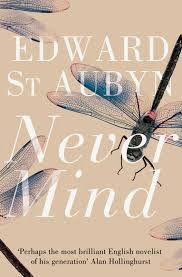
I read MOTHER’S MILK, the last of the Patrick Melrose novels, first, and enjoyed it so much that I’ve decided to go back to the beginning, and read them all.
In MOTHER’S MILK Patrick is in his forties, but in NEVER MIND he is just five. The books are similar though in being lucidly written, witty, and extremely well observed. Here is Patrick’s view on puddles:
In winter there was ice on the puddles, you could see the bubbles trapped underneath and the air couldn’t breathe: it had been ducked by the ice and held under, and he hated that because it was so unfair and so he always smashed the ice to let the air go free.
Nothing will destroy the a cheerfully comic tone of novel quite like a five year old boy being raped by his father, which is what happens about half way through this book. It’s particularly sad, given that the book is apparently autobiographical, and it becomes clear why the entire novel is focusing on just this one day out of Patrick’s childhood.
The father, we learn, is a controlling and unpleasant man, who has thoroughly browbeaten his wife. At one point, after she complains that figs are going to waste, rotting under the tree they have fallen from, he makes he get down on he hands and knees to eat them all. The mother only feels happy in her Buick because to her the “car was like a consulate in a strange city, and she moved towards it with the urgency of a robbed tourist.”
While the father is unpleasant, so too are most other characters. Patrick’s family and friends all live on inherited wealth, and I found it bizarre how much time the spent showing off about their finances. I was surprised by how repellent I found it. I can see showing off if you made the money yourself, but what is the point of showing off if it was your great-great-great grandfather that made it? Perhaps I am just jealous?
THE BELL by Iris Murdoch
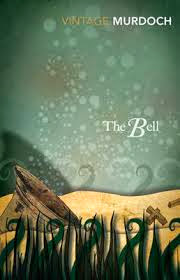
I seem to be reading a number of books at the moment that might best be described as ‘unexpectedly religious,’ and THE BELL is one of these. It tells the story of a commune that has sprung up around an Abbey in rural England. Not everyone at the commune is there for religious reasons, but everyone reaches a new idea of the meaning of their lives by being there.
The central character is a man named Michael, who is gay. This is the forties, so he doesn’t think of himself as being gay, however, but as a ‘pervert,’ and this is at the heart of all his problems. He wants to be a priest, but feels he cannot, and spends much of his energy trying not to be kiss attractive young men (Don’t we all). He is succeeding pretty well and suppressing himself until an eighteen year old arrives in the commune, and he kisses him by accident. Cue much agonising, both for him, and the boy, Toby: “Toby had received, though not yet digested, one of the earliest lessons of adult life: that one is never secure. At any moment once can be removed from a state of guileless serenity and plunged into its opposite, without any intermediate condition, so high about us do the waters rise of our own and other people’s imperfection.”
I tried to feel for Michael, but it was hard to taking truly seriously the idea that being gay might genuinely be perceived as such a curse. I guess it’s testament to how far our society has come, that I can struggle to relate.
While I couldn’t really care for the plot, I continue to admire Murdoch’s writing very much. Try this, about a young woman from London visiting the commune:
She was astonished by the variety of creatures which could be seen on even the most casual stroll about the estate. She felt the slightly scandalised suprise of the true town dweller that all these beasts should be here, displaying themselves, quite free, and getting on with their own lives perfectly unmindful of human patronage and protection.
Or this, on the Abbey’s walls: “The moonlight made the high wall look insubstantial and yet somehow alive, with that tense look of deserted human places at night.” I love that – ‘the tense look’ – I think about it often now when I’m in cities at night.
MOTHER’S MILK by Edward St Aubyn

This is a book that makes me almost look forward to my mid-life crisis, if it’s as funny and insightful as this one.
The crisis in question belongs to a certain Patrick Melrose, and its unfolding is described across four year’s worth of summer holidays. As he describes it: “He tried to remind himself what his youth had really been like, but all he could remember was the abundance of sex and the sense of potential greatness, replaced, as his view closed in on the present, by the disappearance of sex and the sense of wasted potential.” On his daily life: “Most of the time, he couldn’t even imagine the world from his own point of view. He relied on nightfall to give him a crash course in the real despair that underlay the stale, remote, patchily pleasurable days.” I liked this very much. During unhappy periods, I always think it’s key to remember that your day time view of your life is the real one, not your night time view; but he takes the opposite approach.
For a book on despair, it’s hilariously funny. Patrick wants to have sex with everyone he sees, and here he is on a bikini clad woman he sees:
Oh God, why has life so badly organised? Why couldn’t he just hoist her onto a hot car bonnet and tear off that turquoise excuse for a bikini bottom? She wanted it, he wanted it. Well, anyway, he wanted it. She probably wanted exactly what she had, the power to disturb every homosexual man – and let’s not forget our lesbian colleagues, he added with mayoral unction – who she scythed through as she strolled back and forth between her depressing boyfriend and her nippy little car. She walked by, he staggered on. She might as well have choppped off his genitals and chucked them in the sand. He could feel the blood running down his legs, hear the dogs squabbling over the unexpected meat. He wanted to sit down again, to lie down, to bury himself deep underground.
One source of his despair is the fact that he feels abandoned by his wife, who is entirely focused on their two small children. I found this deeply irritating. If you feel your wife is doing too much parenting, how about DOING SOME PARENTING YOURSELF. However the wife is also very irritating, being rather brainless. “As she hoisted (the baby) into her arms, she felt again the extent to which motherhood had destroyed her solitude. . . . Now she was very rarely alone, and if she was, her thoughts were commandeered by her family obligations. Neglected meanings piled up like unopened letters. She knew they contained ever more threatening reminders that her life was unexamined.” However, the author makes an interesting point in her defense: ” . . . she was trying to survive the ceaseless demands of her sons, and the destructive effect on a solitary nature of spending years without a moment of solitude.” I’ve often wondered how solitary parents feel about the amount of time they spend with their children.
I did have some minor quibbles. It’s very much a book of the British upper class, so it’s as narrow as that group, with friends with who were “on the same stair at Trinity,” and people who “Without the editorial influence of the word ‘afford,’ their desires rambled on like unstoppable bores, relentless and whimsical at the same time.” There’s also a lot of whining about how everything is their parents’ fault, which is annoying. However, over all, fantastic book. I’m delighted to find that there are three previous Patrick Melrose novels. I am reading them all.
KEEPERS OF THE HOUSE by Shirely Ann Grau
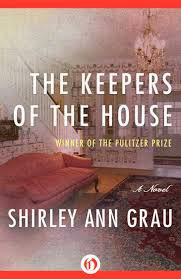
I dread finishing a book these days, because it will mean I need to find a new book. This is not easily done. I tried for a while reading past Booker winners, but this was not a success. The Booker appears to favour novelists who wish they were poets, and to disfavour those who have plots. I have therefore begun the Pulitzer back list, giving such recent titles as THE GOLDFINCH and THE ORPHAN MASTER’S SON. This title is the 1964 winner, and belongs to a genre charmingly known as Southern Gothic.
KEEPERS OF THE HOUSE covers some one hundred and fifty years of the Howland family, who own a large piece of land in the South. We cross about four generations, some of them a little half-heartedly. The primary story is about one Howland who falls in love with a black woman, and brings up his white grandchild with his mixed race children. The revelation of the existence of these mixed race children is deeply upsetting to the white community, and eventually forces the last Howland we meet to make a brave stand against them.
I found this novel somewhat hard to relate to; I think it is so deeply and genuinely Southern that I did not really understand what was going on. For example, when we find out that the white man secretly married the black woman, in order to legitimise the children, I was completely surprised that for the community this is a huge turning point that changes everything. The author seemed to take it for granted that I would understand the implications; I’m sort of glad that I’m apparently too innocent. So I didn’t particularly relate to the Southern, but then I did not relate to the Gothic either; there was lots of disconnected poetry, and mysterious dead-ends, such as one lengthy funeral for a character we’ve barely met.
So, now I need to find something else to read.
HARD TIMES by Charles Dickens
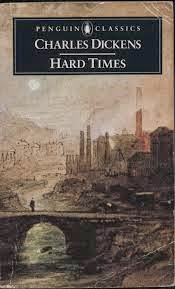
HARD TIMES is a minor work, and it shows.
One wonders how the same man who wrote GREAT EXPECTATIONS and A CHRISTMAS CAROL also came up with this boring preachy book. It tells the story of a gentelman who has brought his children up on the basis that the only thing worth engaging with is facts, entirely ruling out feeling or imagination. In a totally expected plot twist, this being Dickens, an orphan enters their home. Full to bursting with feeling, she is tiresomely obviously right about everything. She is however ignored, with the older daughter marrying a rich man, a friend of her father’s, untroubled by her lack of feelings for him. The son falls apart morally, stealing some money, and attempting to blame the crime on an annoyingly saintly local working man. Just writing about this book is annoying me afresh. The big conclusion sees everyone coming around to the view that the orphan was right all along, and that feelings are as important as facts. For me, the fact was I felt like puking.
There was only one good bit, this description of a bar: “She stopped, at twilight, at the door of a mean little public house, with dim red lights on it. As haggard and shabby, as if, for want of custom, it had itself taken to drinking, and had gone the way all drunkards go, and was very near the end of it.” A charming description, but probably not quite worth slogging through the whole book for.
PS: I trust you have all assigned extra points to me for avoiding any kind of jokes of the “I had a hard time reading this” variety. It was struggle, let me tell you.
LEAN IN by Sheryl Sandberg
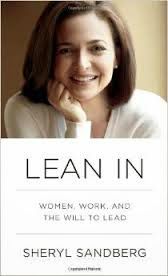
I typically do not read business books, assuming they are largely intended for morons. I read LEAN IN largely because of a speedy manicurist. I was in Lagos, and the lady finished my nails before my friend’s, so I flicked through her copy of this book, and decided I might be a moron it was intended for. I’m glad I read it. It was interesting, and I’ve thought about it frequently since.
Sandberg’s core message is essentially that while it is undoubtedly true that patriachal structures limit womens’ achievements, so too do women themselves. Womens’ internal beliefs as effectively stand in their way as do external factors. She argues that women ought to ‘back themselves.’ They should have more faith in their abilities, and in the fact that they will be able to exercise those abilities professionally while also having a family and friends.
There is much interesting data. For example:
. . .the risk of divorce reduces by about half when a wife earns half the income and a husband does half the housework
and
Today, stay at home mothers spend about seventeen hours per week on primary child care, on average, while mothers who work outside the home spend about eleven hours. This means that an employed mother today spends about the same amount of time on primary child care activities as a nonemployed mother did in 1975. . . . Today, a ‘good mother’ is always around and always devoted to the needs of her children. Sociologists call this relatively new phenomenon ‘intensive mothering’ and it has culturally elevated the importance of women spending large amounts of time with their children.
There’s much well known stuff on how the same CV given a male and a female name will invariably be reviewed more favourably in the former case; on how men routinely overestimate their performance on standard tests and women routinely under-estimate them; and so forth. My colleague found this book inspiring; I found it depressing. It’s not so much the data that kills you, as the personal anecdotes of a woman who has been in business for over thirty years. Here she is on the fact that when a new position comes up, men are banging on her door to be considered, while women virtually never are, until she encourages them.
I have had countless conversations where women responded to this encouragement by saying, “I’m just not sure I’d be good at that.” Or “That sounds exciting, but I’ve never done anything like it before.” Or “I still have a lot to learn in my current role.” I rarely, if ever, heard these kinds of comments from men.
I guess we’re screwed. It makes me wish I was born fifty years later, except for the whole oceans rising thing.
BOYHOOD ISLAND by Karl Ove Knausgaard
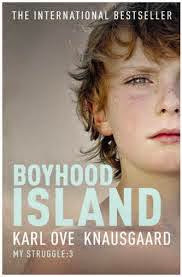
This is book 3 in a 6 part series. It is however not about dragons, or boy wizards, or whatever; but instead the autobiography of one Norwegian man. One might wonder how one can fill 3000 pages with a life not full of fire-breathing fictional characters, but somehow Knausgaard manages it. I read his A MAN IN LOVE earlier this year, which covers his second marriage, and the birth of his children. This next novel goes back in time, to cover his childhood ages six to twelve.
I loved A MAN IN LOVE, which was a very comforting account of wrong turns and missed opportunities. I’m not quite so fond of BOYHOOD ISLAND, perhaps because one childhood is much like another. Thus there is much in the way of learning to swim, pee-ing out doors, finding pornographic magazines, and etc. There is however much about it that is vintage Karl Ove, which I really enjoyed. (So intimate are these books, its hard to think of him by his surname.) For example: Oh, isnt that why shadows get longer in the evening? They are reaching out for the night, this tidal water of darkness that washes over the earth to fulfil for a few hours the shadows’ innermost yearnings. Or, the following, which I’ve been thinking a lot about as I am on a family holiday, so there is much in the way of photography: “It is the era that we take photos of, not the people in it, they can’t be captured. Not even the people in my immediate circle can.”
In A MAN IN LOVE we learn that Karl Ove had a troubled relationship with his father. He does seem a very stern disciplinarian, with very harsh punishments for lost socks. We must recall though that this is all told from the child’s perspective, so I’m not sure how trustworthy it all is. Karl Ove seems to have been something of a wimp. He is scared of normal things, eg., headless men, mummies, but also an array of other things: e.g., “I was so afraid of the hot water in the bathroom.” I”m not sure he’s a totally reliable narrator.
Lastly, I did enjoy once again being immersed in the almost creepy safety of Scandinavia. Speaking of a photo, he says his father is “sitting on a mountainside drinking coffee from the same red Thermos top, as he forgot to pack any cups” What! I thought the lid of the Thermos was supposed to be a cup? I thought that was the point?
I can’t wait for Book 4. Maybe we’ll get some dragons.
THE ORPHAN MASTER’S SON by Adam Johnson
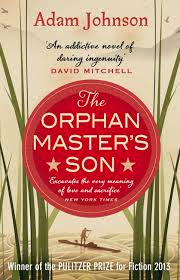
THE ORPHAN MASTER’S SON is a strange novel, being an action fantasy disguised as a literary novel set in North Korea. It tells the story of an orphan who is sure he is not an orphan, because the terrible treatment he receives from the orphan master is only explicable for him as an attempt to hid his great affection for his son. This sad and weird reasoning sets the tone for what is a very odd book.
The orphan goes on to be in the army, then on a fishing boat, then in a prison mine, then he is the prime taekwondo hero of North Korea, before going on to torture and death. I think it’s supposed to be magically real, but I just found it so unlikely as to be difficult to engage with. However, I do wonder how else one can write a novel about North Korea, a country so utterly improbable that I suspect any story there would not seem probable. The book gives horrible detail on the experience of prison mines, for example, where prisoners are pushed in to the mine, and never let out again at all. They simply come to the gate when they find ore, and are able to exchange the ore for candles and food, but they never seen sunshine again. It’s also horribly comic, as when a Korean movie star sees CASABLANCA for the first time, and asks: “But I do not understand. What is this film glorifying?”
While I did not enjoy the book very much, I did find it interesting to learn about North Korea. I can’t believe such a country actually exists; it seems like some kind of low budget horror movie, not a real place on the map.
THE SHOCK OF THE FALL BY Nathan Filer
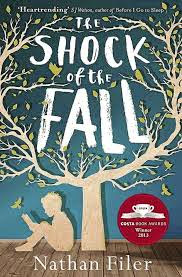
This book is full of stuff British culture loves:
– Children who die
– Children with special needs
– Mental illness
– NHS cuts
Basically this child who has special needs dies because of a mistake made by this other child who has a mental illness. Later this child is affected by NHS cuts. I hate to be a hater, but BLAH BLAH BLAH.
